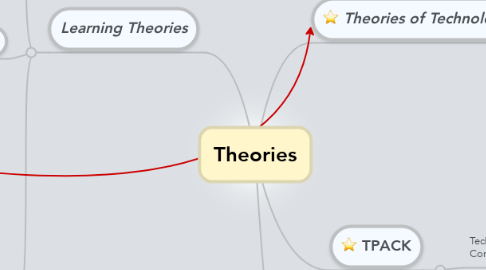
1. Learning Theories
1.1. Constructivism
1.1.1. Basic Principles
1.1.1.1. learning is constructed on previous knowledge
1.1.1.2. learning is active
1.1.1.3. new experiences either agree with previous knowledge, or requires a modification
1.1.1.4. reflection is important to learning
1.1.2. Implications for Teaching
1.1.2.1. requires authentic & challenging learning experiences
1.1.2.2. learning community (collaboration between new learners and experts)
1.2. Connectivism
1.2.1. Basic Principles
1.2.1.1. learning is the process of connecting nodes of information
1.2.1.2. learning is a knowledge creation (not consumption) process
1.2.1.3. actuation is important
1.2.1.4. building knowledge through new connections
1.2.2. Implications for Teaching
1.2.2.1. learning happens in practical ways
1.2.2.2. knowing where to find info > knowing info
1.2.2.3. develop connections among materials and people
1.3. Cognitive Load
1.3.1. Basic Principles
1.3.1.1. the brain can only process a certain amount of information at a time
1.3.1.1.1. working memory
1.3.1.1.2. long-term memory
1.3.1.2. Use our prior knowledge (from long-term memory) to connect to learning new ideas
1.3.2. Implications for Teaching
1.3.2.1. adapt the lessons to the learner (beginner/advanced) so they aren't overloaded
1.3.2.2. remove extraneous material
1.3.2.3. teach meaningful chunks of content
2. Theories of Technology
2.1. Social Construction of Technology (SCOT)
2.1.1. Basic Principles
2.1.1.1. human action shapes technology
2.1.1.2. technology is only fully understood within its social context
2.1.1.3. "the best" technology depends on who it's for
2.1.2. Implications for Teaching
2.1.2.1. choose technology that is applicable to your population and practice
2.2. Media Ecology
2.2.1. Basic Principles
2.2.1.1. technology is an extension of the human nervous system
2.2.1.2. technology controls life
2.2.1.3. we've gone through tribal, literary, print ages and are now in the electronic age
2.2.2. Implications for Teaching
2.2.2.1. technology affects our society, therefore we must ensure our students are digitally literate
3. TPACK
3.1. Technological Pedagogical Content Knowledge
3.1.1. The knowledge teachers need to effectively teach technology
3.1.1.1. Content (CK)
3.1.1.2. Pedagogy (PK)
3.1.1.3. Technology (TK)
3.1.2. Dynamic relationship between the components depending on the context
3.1.2.1. Venn Diagram showing the relationship
4. Philosophy of Teachnology
4.1. A teacher's view of how technology could and should be used for teaching
4.1.1. how you'll use technology to teach
4.1.2. what technology you'll allow your students to use
4.1.3. how students will learn how to use it
4.1.4. why you think it's important for students to learn using technology
